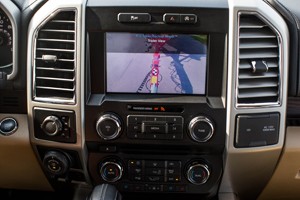

“Backing up a vehicle with a trailer attached is a difficult task for many drivers since it requires counter-steering, or turning the steering wheel in the opposite direction of where you want the trailer to go,” said Taehyun Shim, professor of mechanical engineering, University of Michigan-Dearborn. “Small errors in steering are amplified, and the trailer often departs from the desired path.”
Now, a new feature created through a partnership with UM-Dearborn and Ford may help ease the frustration many drivers face when backing up a trailer. The segment-exclusive feature—called Pro Trailer Backup Assist—takes the guesswork out of steering. It debuts on the 2016 Ford F-150, which will be available this winter.
To operate Pro Trailer Backup Assist, the customer rotates a knob to indicate how much the system should turn the trailer. The technology automatically steers the truck to turn the trailer the desired amount. The system may limit vehicle speed to enhance occupant comfort over various road surfaces. The result is less time required to back up a trailer with improved confidence—it even helps towing experts by reducing time lost to maneuvering mistakes.
Shim began working with Ford on the feature in 2008 to develop the control algorithm that generates the desired steering angle. He said getting the algorithm right for the system meant the difference between a smooth experience and potentially jackknifing the trailer.
“For Pro Trailer Backup Assist, we developed a method using vehicle/trailer parameters to determine the hitch angle limits where the control system operates effectively while helping prevent the vehicle and trailer from jackknifing. The control system then uses an algorithm to generate the desired steering angle in order to maneuver the trailer into position,” Shim said.
Shim worked with Ford on the project as part of the Ford-University of Michigan Innovation Alliance. The alliance—which began in 2006, with UM-Dearborn joining in 2007—partners Ford researchers with U-M faculty to develop technologies that create a competitive advantage.
"The collaborative Ford/University of Michigan-Dearborn project that first demonstrated the feasibility of trailer backup assist is an archetypical example of successful company-university collaboration,” said Ed Krause, global manager, external alliances, Ford. “Prof. Shim's groundbreaking practical research and his ready willingness to actively collaborate is a credit to the applied research focus of the College of Engineering and Computer Science at UM-Dearborn.”
John Cristiano, co-director of UM-Dearborn’s Institute for Advanced Vehicle Systems (IAVS), said the Ford-UM Innovation Alliance allows UM-Dearborn faculty and students to apply their expertise to product and process improvements.
“The Pro Trailer Backup Assist feature is an excellent example of what can be achieved through a strong, collaborative, faculty-industry relationship that is a hallmark of our partnership with Ford,” he said. “The alliance is one of the ways the university sparks innovation and economic growth in southeast Michigan while providing real-world, experiential learning opportunities for students.”
Video of Ford trailer back-up assist technology developed in partnership with @UM_Dearborn #MCity pic.twitter.com/jJMJbSGrQO
— U-M BEC (@uofmbec) July 20, 2015




